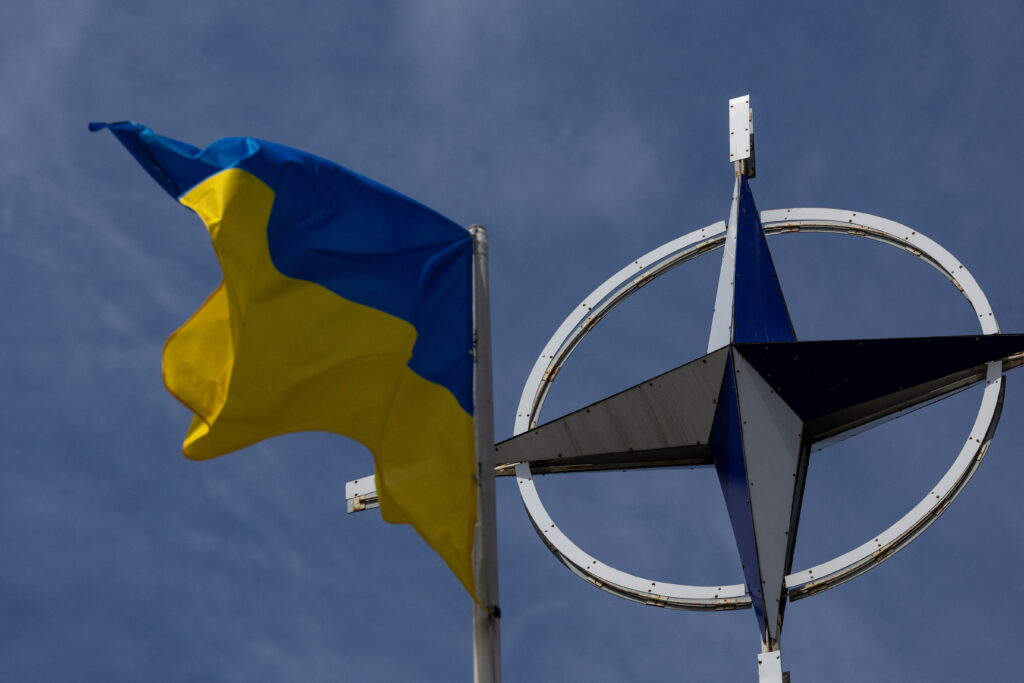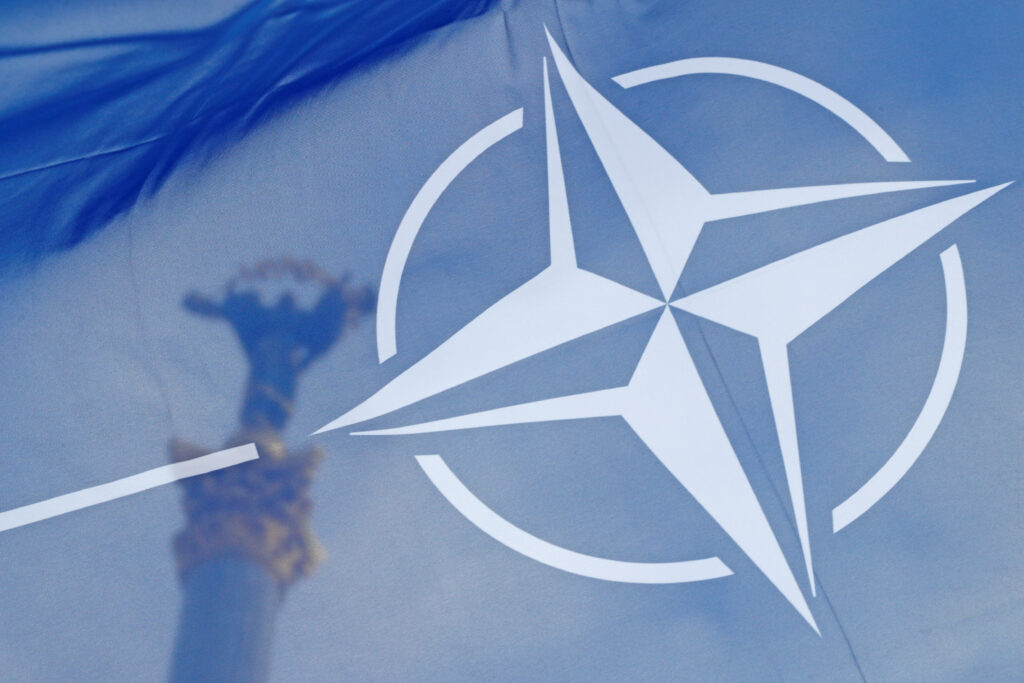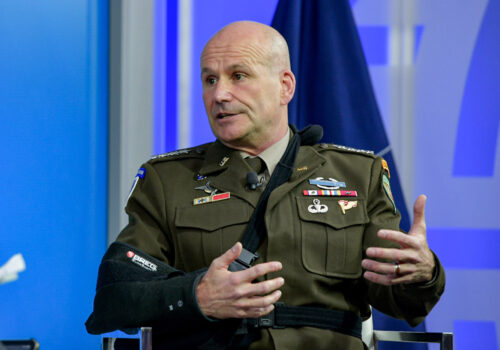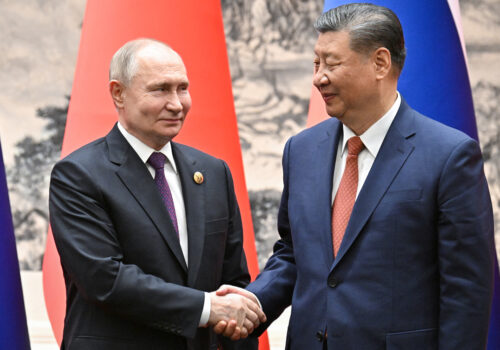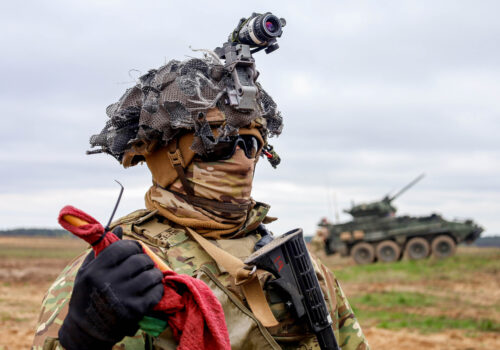Watch the full event
It’s time for the West to “wake up,” with regard to Russia’s war in Ukraine, former NATO Secretary General Anders Fogh Rasmussen said Tuesday. “The damage done by our hesitancy can be counted in Ukrainian lives.”
Rasmussen issued his call to accelerate military support to Ukraine at an Atlantic Council event hosted by the Eurasia Center. There, he joined US, European, and Ukrainian officials and experts in mapping out their recommendations for what the Alliance should achieve for Ukraine at July’s NATO Summit in Washington.
Over the past two years, “our soldiers had to buy time for the Western decision makers far too often,” Head of the Ukrainian President’s Office Andriy Yermak said. Ahead of the summit, Rasmussen and Yermak led a working group to consolidate recommendations from former leaders across the Alliance.
The call was echoed by Senate Minority Leader Mitch McConnell (R-KY), who urged Washington to “move at the speed of relevance, not the speed of bureaucracy” to support Ukraine.
Below are more highlights from the conference, during which several former and current officials and top experts laid out what they would like to see from the NATO Summit when it comes to Ukraine.
Ukraine’s NATO membership
- “Transatlantic security is kind of a puzzle. It can never be perfect when some piece is missing. Today, the piece is Ukraine,” Yermak said, adding that the world is approaching a “point of no return”—one where the “puzzle” will either fracture, resulting in a divided Alliance, or will become complete.
- Drawing from the working group’s findings, Rasmussen argued that NATO leaders should invite Ukraine to accession talks in Washington in July and also set a target date for Ukraine’s NATO membership for no later than July 2028.
- “Opening accession talks does not mean that Ukraine will join NATO overnight, but it sends a critical message to Putin that Ukraine’s NATO membership is inevitable, that continuing his illegal war will not prevent it,” Rasmussen said.
- Former UK Prime Minister Liz Truss also spoke virtually at the event, agreeing that she wants Ukraine to become a NATO member “as soon as possible” so that the Alliance is “able to collectively defend . . . against future threats from authoritarian regimes.”
- Yermak argued that an invitation to NATO for Ukraine would not only be cost-effective in bolstering the Alliance’s defenses, but it would also be “an acknowledgement of Ukrainian bravery and their struggle for freedom.” He added that “if Ukraine stands, Europe stands. If Ukraine falls, the Kremlin will choose its next victim.”
New defense options
- Rasmussen also argued that NATO leaders should “adopt measures to contain the war and bring it to a favorable conclusion for Ukraine.” That, he said, should include lifting the West’s restrictions on Ukraine striking Russian missile launchers, or other limits to how Ukraine uses the weapons it is provided. Two years in, Rasmussen said, “allies are still asking Ukraine to fight with one arm tied behind its back,” he warned.
- Yermak said that Ukraine most needs air defenses from Europe. Rasmussen added that he hoped to see NATO launch a humanitarian air-defense shield over western Ukraine that could mimic the assistance the United States and others gave to Israel to intercept an Iranian attack last month.
Bolster the Alliance
- McConnell said that he hoped to see allies in July “reach a greater shared understanding” that spending 2 percent of gross domestic product (GDP) on defense—and 20 percent of that on equipment—“cannot be an end goal. These targets have to be a baseline,” he said.
- “Anyone who still sees the requirements of collective defense as a matter of special funds or emergency supplementals is . . . missing the point,” he warned.
- Truss agreed, saying that “the West,” and particularly Europe, “hasn’t spent enough on defense.” She said that the United Kingdom’s recent 2.5 percent of GDP commitment was good, but that she’d like to see NATO countries spend “at least” 3 percent.
- McConnell called on NATO countries to understand how Russia, Iran, and China “reinforce one another” with their actions, and “how the world’s autocrats are training, equipping, backfilling, and covering for one another’s aggressive gambles.” Truss added that securing the global order will require continued support for Ukraine but also a refusal to negotiate with Russia, a discouragement of China’s aims toward Taiwan, and efforts to stop Iran from developing a nuclear weapon.
- With the summit nearing and the US presidential election on the way, Rasmussen highlighted two arguments he believes Ukraine’s supporters should make: First, if Vladimir Putin wins in Ukraine, the future US president—whoever it will be—will be portrayed as “a loser.” Second, ensuring Russian defeat in Ukraine can help the United States deal with the China challenge. “I don’t see any single argument against giving Ukraine everything [it needs] to win,” he said.
Katherine Walla is an associate director on the editorial team at the Atlantic Council.
Watch the event
Further reading
Fri, May 17, 2024
NATO must ‘win up front but be ready to win long’ in modern warfare, says General Christopher Cavoli
New Atlanticist By Katherine Golden
At an Atlantic Council Front Page event, Cavoli spoke about the war in Ukraine, NATO's modernization efforts, the China challenge, and more.
Thu, May 16, 2024
Experts react: What will Putin and Xi’s ‘new era’ of cooperation mean for the world?
New Atlanticist By
The Russian president and the Chinese leader just met in Beijing to celebrate their increasing cooperation to create a new global order.
Mon, May 6, 2024
Dispatch from Vilnius: Allies still waiting for the ‘Long Telegram’ from Washington
New Atlanticist By Andrew D’Anieri, Doug Klain
US and European policymakers should learn from the urgency with which frontline nations regard the threat of a Russian invasion.
Image: A Ukrainian national flag rises in front of the NATO emblem, amid Russia's attack on Ukraine, in central Kyiv, Ukraine July 11, 2023. REUTERS/Valentyn Ogirenko
